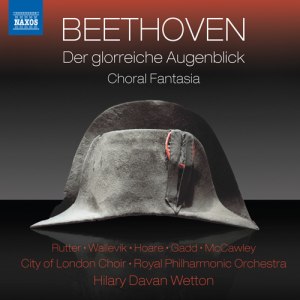 |
 |
|


alternatively
CD: MDT
AmazonUK
AmazonUS
Sound
Samples & Downloads |
Ludwig van BEETHOVEN
(1770-1827)
Der glorreiche Augenblick, Op. 136 (1824) [37:52]
Choral Fantasia in C minor for piano, chorus and orchestra, Op.
80 [19:49]
 Claire Rutter (soprano); Matilde Wallevik (mezzo); Peter Hoare (tenor);
Stephen Gadd (baritone); Additional soloists in Choral Fantasia:
Marta Fontanals-Simmons (mezzo); Julian Davies (tenor); City of
London Choir; Westminster Boy’s Choir
Claire Rutter (soprano); Matilde Wallevik (mezzo); Peter Hoare (tenor);
Stephen Gadd (baritone); Additional soloists in Choral Fantasia:
Marta Fontanals-Simmons (mezzo); Julian Davies (tenor); City of
London Choir; Westminster Boy’s Choir
Royal Philharmonic Orchestra/Hilary Davan Wetton
rec. Cadogan Hall, London, England, 5-6 February 2011
 NAXOS 8.572783 [57:41]
NAXOS 8.572783 [57:41]
|
|
|
This new recording offers up a genuine Beethoven rarity, his
Der glorreiche Augenblick (The Glorious Moment), coupled
with the Choral Fantasia. Currently, the only other readily
available recording of this cantata is part of Brilliant Classics’
boxed set of Beethoven’s Complete Works (85 CDs).
Composed in 1814, it was commissioned by the Vienna City Administration
to celebrate the opening of the Congress of Vienna. The group
was meeting to redraw the map of Europe after the defeat of
Napoleon. Beethoven began work in October, completing it quickly,
in time for its first performance - after three postponements,
in part because the copyists were struggling to decipher Beethoven’s
writing - on 29 November 1814. While the music was well received,
the text, assembled and written by Alois Weissenbach, was almost
unanimously disparaged. The score was only published after Beethoven’s
death, and many editors replaced Weissenbach’s text with
text they deemed more equal to the music. In fact, the score
I consulted for this review has a text best translated as “Serenade
to Music”.
Each soloist plays an allegorical character: the soprano is
the city of Vienna, the mezzo-soprano is a Prophetess, the tenor
is Genius and the bass is Leader of the People. Yet despite
this uninspiring libretto, Beethoven created a work with finely
wrought, interesting music that deserves to be better known.
It begins with a great choral outburst, the choir proclaiming
“Europe stands!” The homophonic texture soon gives
way to a fugue that, in turn, leads into another fugue - an
interesting precursor of the final section of the “Gloria”
in the Missa Solemnis) A recitative follows with the
joyful mood of the chorus instantly softened to tranquility
by the cello soloist’s lovely arch of melody; beautifully
played here by Ben Highes. The bass calls the people together
to witness the “imperial mantle” returning. A tenor
arioso follows, surely one of Beethoven’s most gorgeous
melodies, swiftly moving into a chorus extolling the glories
of Vienna. This builds to a powerful climax, the different sections
of the choir wildly proclaiming “Vienna! Vienna!”
accompanied by whooping horns. The following recitative and
aria sound positively Mozartian as the soprano praises the Sovereigns
gathering together, encouraging them to unify and rebuild Europe.
The aria then develops into a constantly shifting dialogue between
the soprano, chorus and violin solo, moving from moments of
peaceful beauty to vigorous - read contrapuntal - celebration.
The mezzo-soprano enters, exhorting the peoples of Europe to
“kneel down, people, and pray first to Him who has delivered
you.” Beethoven responds with achingly beautiful music
that evokes a prayerful atmosphere. Finally, the soloists join
in thanking God for their recent victory. Beethoven then has
the different sections of the choir gradually enter: first the
women, then the children’s choir, and finally the men,
everyone finally together. They are accompanied by a full orchestra
that includes the Turkish instrumentation of the Ninth Symphony.
An overwhelming fugal climax arrives as all sing “Vienna,
hail and good fortune! World, your great moment!”
This is a richly scored, powerfully affecting score. I can imagine
certain passages faster, sung with greater fervor. I wish the
excellent horn players had been encouraged to play with more
abandon. However these are minor quibbles against an excellent
performance of music that should be better known.
The Choral Fantasia suffers from no such neglect, though
it too, has its unique hybrid form which has certainly been
the subject of criticism. Its many sections and transitions
can all too easily be allowed to sound like disjointed patchwork.
Wetton and his forces have created an organic whole, one passage
flowing into another with absolute naturalness, in a masterly
performance. Leon McCawley’s opening piano solo conveys
a wonderful sense of improvisatory freedom. Beethoven did not
have the piano part written out in time for the premiere, so
he simply improvised the beginning section on the spot. The
variations for the piano and orchestra are played with drive
and elegance in turn, featuring consistently lovely solo work
from the orchestra. McCawley dispatches Beethoven’s difficult
piano writing with aplomb and with the entrance of the voices
the energy begins a build-up that leads to an overwhelming climax
for the final bars.
The soloists are generally impressive, though both the soprano
and baritone have a pronounced vibrato that could prove tiresome
with repeated listening. The choirs are consistently excellent
and they make light of Beethoven’s demanding vocal writing.
The playing of the Royal Philharmonic is first-rate in every
way, revealing an adoption of historically informed performance
practice. Hilary Davan Wetton’s enthusiasm and love for
both works is obvious, and, along with Naxos, he deserves special
kudos for recording this Beethoven rarity.
David A. McConnell
see also review by Paul
Godfrey
|
|




 All Nimbus reviews
All Nimbus reviews








